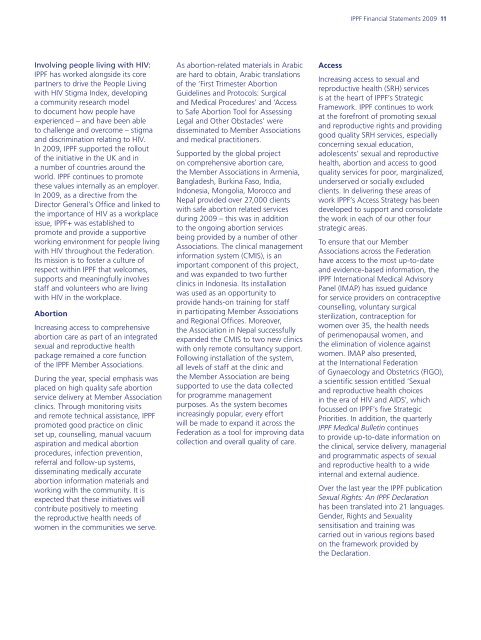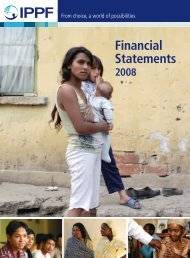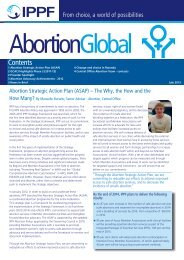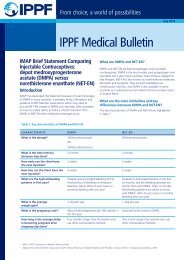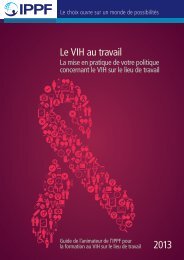Financial Statements - International Planned Parenthood Federation
Financial Statements - International Planned Parenthood Federation
Financial Statements - International Planned Parenthood Federation
Create successful ePaper yourself
Turn your PDF publications into a flip-book with our unique Google optimized e-Paper software.
IPPF <strong>Financial</strong> <strong>Statements</strong> 2009 11<br />
Involving people living with HIV:<br />
IPPF has worked alongside its core<br />
partners to drive the People Living<br />
with HIV Stigma Index, developing<br />
a community research model<br />
to document how people have<br />
experienced – and have been able<br />
to challenge and overcome – stigma<br />
and discrimination relating to HIV.<br />
In 2009, IPPF supported the rollout<br />
of the initiative in the UK and in<br />
a number of countries around the<br />
world. IPPF continues to promote<br />
these values internally as an employer.<br />
In 2009, as a directive from the<br />
Director General’s Office and linked to<br />
the importance of HIV as a workplace<br />
issue, IPPF+ was established to<br />
promote and provide a supportive<br />
working environment for people living<br />
with HIV throughout the <strong>Federation</strong>.<br />
Its mission is to foster a culture of<br />
respect within IPPF that welcomes,<br />
supports and meaningfully involves<br />
staff and volunteers who are living<br />
with HIV in the workplace.<br />
Abortion<br />
Increasing access to comprehensive<br />
abortion care as part of an integrated<br />
sexual and reproductive health<br />
package remained a core function<br />
of the IPPF Member Associations.<br />
During the year, special emphasis was<br />
placed on high quality safe abortion<br />
service delivery at Member Association<br />
clinics. Through monitoring visits<br />
and remote technical assistance, IPPF<br />
promoted good practice on clinic<br />
set up, counselling, manual vacuum<br />
aspiration and medical abortion<br />
procedures, infection prevention,<br />
referral and follow-up systems,<br />
disseminating medically accurate<br />
abortion information materials and<br />
working with the community. It is<br />
expected that these initiatives will<br />
contribute positively to meeting<br />
the reproductive health needs of<br />
women in the communities we serve.<br />
As abortion-related materials in Arabic<br />
are hard to obtain, Arabic translations<br />
of the ‘First Trimester Abortion<br />
Guidelines and Protocols: Surgical<br />
and Medical Procedures’ and ‘Access<br />
to Safe Abortion Tool for Assessing<br />
Legal and Other Obstacles’ were<br />
disseminated to Member Associations<br />
and medical practitioners.<br />
Supported by the global project<br />
on comprehensive abortion care,<br />
the Member Associations in Armenia,<br />
Bangladesh, Burkina Faso, India,<br />
Indonesia, Mongolia, Morocco and<br />
Nepal provided over 27,000 clients<br />
with safe abortion related services<br />
during 2009 – this was in addition<br />
to the ongoing abortion services<br />
being provided by a number of other<br />
Associations. The clinical management<br />
information system (CMIS), is an<br />
important component of this project,<br />
and was expanded to two further<br />
clinics in Indonesia. Its installation<br />
was used as an opportunity to<br />
provide hands-on training for staff<br />
in participating Member Associations<br />
and Regional Offices. Moreover,<br />
the Association in Nepal successfully<br />
expanded the CMIS to two new clinics<br />
with only remote consultancy support.<br />
Following installation of the system,<br />
all levels of staff at the clinic and<br />
the Member Association are being<br />
supported to use the data collected<br />
for programme management<br />
purposes. As the system becomes<br />
increasingly popular, every effort<br />
will be made to expand it across the<br />
<strong>Federation</strong> as a tool for improving data<br />
collection and overall quality of care.<br />
Access<br />
Increasing access to sexual and<br />
reproductive health (SRH) services<br />
is at the heart of IPPF’s Strategic<br />
Framework. IPPF continues to work<br />
at the forefront of promoting sexual<br />
and reproductive rights and providing<br />
good quality SRH services, especially<br />
concerning sexual education,<br />
adolescents’ sexual and reproductive<br />
health, abortion and access to good<br />
quality services for poor, marginalized,<br />
underserved or socially excluded<br />
clients. In delivering these areas of<br />
work IPPF’s Access Strategy has been<br />
developed to support and consolidate<br />
the work in each of our other four<br />
strategic areas.<br />
To ensure that our Member<br />
Associations across the <strong>Federation</strong><br />
have access to the most up-to-date<br />
and evidence-based information, the<br />
IPPF <strong>International</strong> Medical Advisory<br />
Panel (IMAP) has issued guidance<br />
for service providers on contraceptive<br />
counselling, voluntary surgical<br />
sterilization, contraception for<br />
women over 35, the health needs<br />
of perimenopausal women, and<br />
the elimination of violence against<br />
women. IMAP also presented,<br />
at the <strong>International</strong> <strong>Federation</strong><br />
of Gynaecology and Obstetrics (FIGO),<br />
a scientific session entitled ‘Sexual<br />
and reproductive health choices<br />
in the era of HIV and AIDS’, which<br />
focussed on IPPF’s five Strategic<br />
Priorities. In addition, the quarterly<br />
IPPF Medical Bulletin continues<br />
to provide up-to-date information on<br />
the clinical, service delivery, managerial<br />
and programmatic aspects of sexual<br />
and reproductive health to a wide<br />
internal and external audience.<br />
Over the last year the IPPF publication<br />
Sexual Rights: An IPPF Declaration<br />
has been translated into 21 languages.<br />
Gender, Rights and Sexuality<br />
sensitisation and training was<br />
carried out in various regions based<br />
on the framework provided by<br />
the Declaration.


